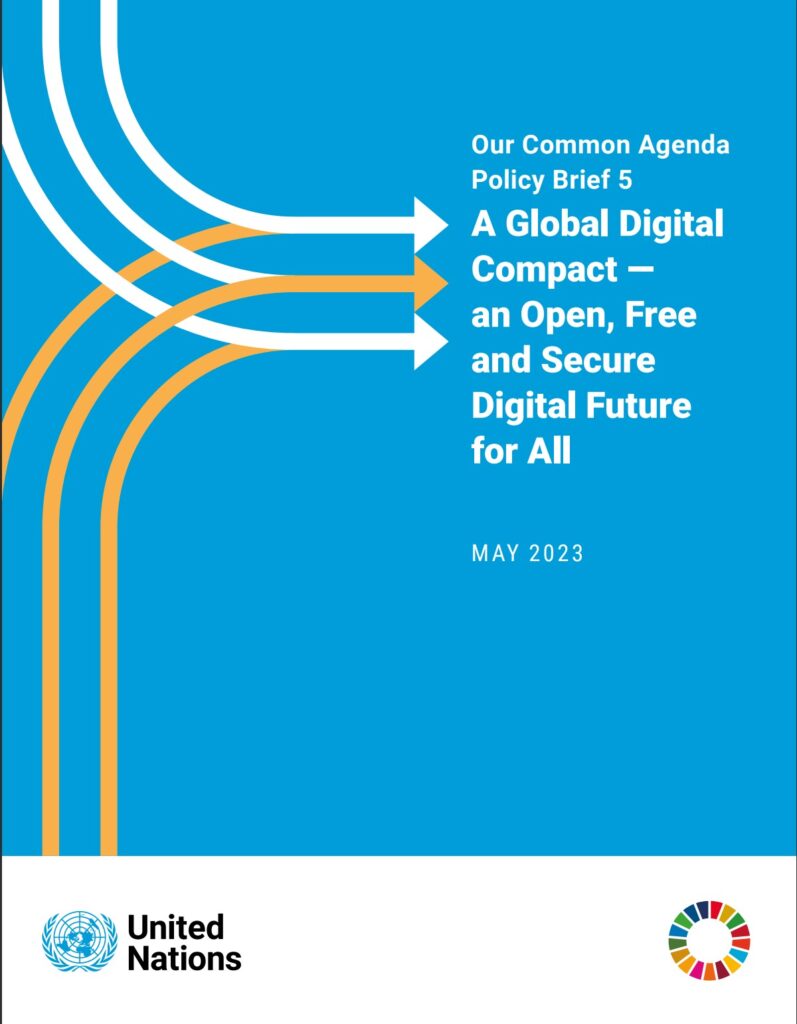The Global Digital Compact:
Combining Digital Development and Data for Development
by
Shaida Badiee
29 May 2024
 On the occasion of the 75th anniversary of the United Nations in 2020, the secretary general of the United Nations in consultation with a High-Level Advisory board laid out a series of commitments to tackle endemic development challenges and bring the Sustainable Development Goals (SDGs) back on track. Improving digital cooperation and development is one of these commitments and is to be accomplished using a Global Digital Compact, which “would articulate a shared vision of an open, free, secure and human-centered digital future that rests on the purposes and principles of the Charter of the United Nations, the Universal Declaration of Human Rights and the 2030 Agenda.” This involves multi-stakeholder cooperation, articulating shared principles, objectives and concrete actions for implementation.1
On the occasion of the 75th anniversary of the United Nations in 2020, the secretary general of the United Nations in consultation with a High-Level Advisory board laid out a series of commitments to tackle endemic development challenges and bring the Sustainable Development Goals (SDGs) back on track. Improving digital cooperation and development is one of these commitments and is to be accomplished using a Global Digital Compact, which “would articulate a shared vision of an open, free, secure and human-centered digital future that rests on the purposes and principles of the Charter of the United Nations, the Universal Declaration of Human Rights and the 2030 Agenda.” This involves multi-stakeholder cooperation, articulating shared principles, objectives and concrete actions for implementation.1
After a series of consultations with governments, civil society, and the private sector based on the Zero Draft of the Global Digital Compact, the co-facilitators (Governments of Sweden and Zambia) published a first revision on 15 May 2024, which will be used to spur further discussions on the Compact at events leading up to the Summit of the Future in September 2024, where it will be formally adopted by the General Assembly.
While the focus of the current version of the Global Digital Compact remains firmly on digital development, the data for development space is well-represented in the current vision for digital development, which Open Data Watch wholeheartedly supports. Among the five objectives of the Global Digital Compact, Objective 4 on “Advancing responsible and equitable international data governance” is particularly relevant to official statistics and data for development.
The Compact introduces Data exchanges and standards as an important pillar of responsible and equitable data governance, recognizing that “that shared data standards and interoperable data exchanges can increase the accessibility and sharing of data and help close data divides. We will enable open data and data commons that support states, communities, groups and individuals, respectively, to utilize and leverage data for their development and wellbeing.” This emphasis on open data and interoperability and metadata standards will be crucial to implementing the plans for improving digital cooperation within and between countries. At Open Data Watch, we monitor the state of open data around the world using the Open Data Inventory, currently in its seventh round, and work with countries and international organizations, such as the UN Statistics Division, to improve the capacity of countries to open up more of their data according to open data standards. More open data will mean more metadata and better interoperable data systems, which are also in service of better digital development.
The Compact goes on to commit to better data for development, recalling that “quality data is critical for tracking, targeting and accelerating progress across the SDGs as well as responding effectively to crises.” To build better systems for data for development and close data gaps, the current iteration of the Compact commits to “a 50 percent increase in financing for sustainable development data […,] a 50 percent increase in the data available to monitor the SDGs, disaggregated by gender and other relevant characteristics […, and to] develop open and accessible data systems to support effective disaster early-warning and crisis response.” Although the implementation map for the Compact is still to be confirmed, at ODW we are excited to contribute tools such as the Clearinghouse for Financing Development Data, the Open Data Inventory, and newer tools like the Gender Data Compass to track these commitments and support their implementation.
The Global Digital Compact represents an incredible opportunity to focus global and coordinated action around the crucial topic of digital development, bringing the billions online and doing so in a safe and responsible manner, while also building data systems that protect privacy and deliver crucial insights for better policy. At Open Data Watch, we stand ready to support the implementation of the Compact and collaborating with all partners to ensure data for development and digital development work hand in hand.







